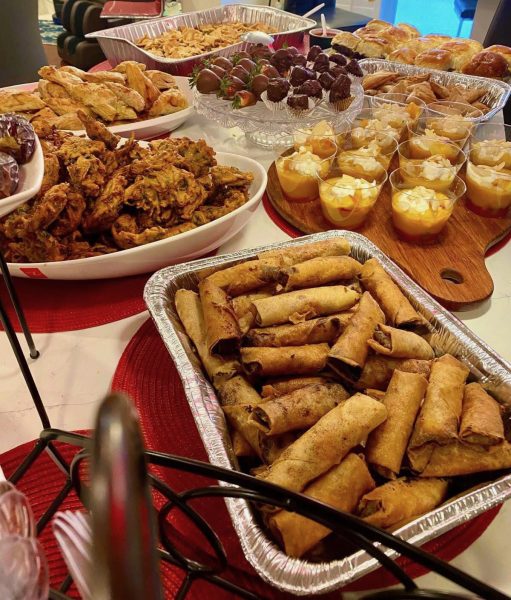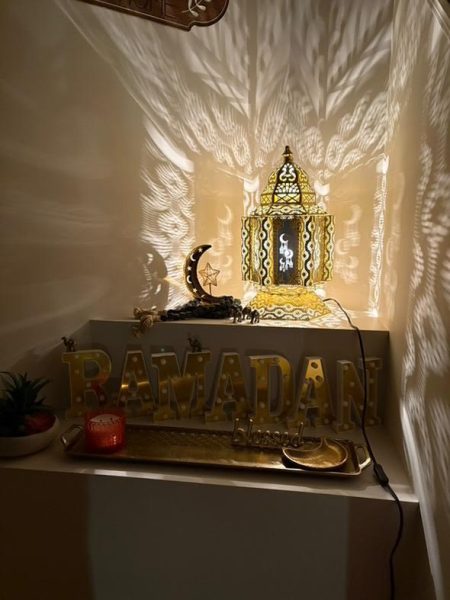Ramadan is more than just a month for me. It’s a time for deep reflection, for emotional cleansing and for reconnecting with myself and my faith. It’s a time when I block out distractions from the world and focus on my relationship with God, my family and my community.
Every year, as the month of Ramadan approaches, there’s a sense of anticipation. I feel as though I’m about to embark on something that will challenge me in ways I can’t predict, but something that I know will ultimately shape me into a better person.
Growing up, I didn’t fully grasp what Ramadan meant beyond the fasting – the long, exhausting
days of hunger and thirst. I’d get asked the same questions every year: How do you not get thirsty or
hungry? You can’t even drink water all day? People often seem shocked or confused that we choose to go without food and water from sunrise to sunset and think its torture, but its far from it.
As I’ve grown older, I’ve come to realize that fasting is only a small part of what Ramadan is truly about — it’s so much more than that.
One of the most profound aspects of Ramadan for me is the spiritual cleansing it brings. Ramadan strengthens me both physically and mentally, helping me learn self-control and self-discipline. Fasting isn’t just abstaining from food; it’s about abstaining from bad habits and from distractions. It forces me to confront my weaknesses, to work through my impatience and my selfishness. It helps me focus on becoming better — not just as a Muslim, but as a person.
I think about the moments when my thoughts drift away from my prayers, and how Ramadan pulls me back. Every prayer during this month feels heavier, more intentional. Every act of worship is a way of purifying myself. It’s a reset — a chance to refine my character, to let go of my past mistakes.
There’s something so beautiful about the way Ramadan brings my family together. My mom, without
fail, wakes up in the early hours of the morning to prepare suhoor, the pre-dawn meal that sustains us throughout the day.

And then, when iftar time comes — when the call to prayer rings out, and it’s time to break the fast — my mom
is there again, making the evening meal. The smell of fried samosas, chicken spring rolls and fruit chaat, and sweet, refreshing roohafza fills the house.
For me, that pink milk drink is the highlight of the meal. It’s not just a drink; it’s a memory, a tradition that takes me back to when I was younger, sitting at the table with my family, eagerly waiting to drink it. It’s one of the little joys of Ramadan.
There’s something so comforting in that moment, when the thirst is finally quenched, and the hunger is satisfied. But it’s not just the food; it’s the feeling of togetherness.
My sister is another source of joy during Ramadan. She’s the one who does all our mehndi (henna) designs. Every Eid, we all sit together in the living room as she carefully applies the patterns to our hands. We laugh, talk and watch shows together to pass the time. It’s a tradition we’ve had for as long as I can remember. It’s these small moments that make Ramadan feel so special to me.
I remember when I was younger, I tried to “half fast,” telling myself I would just drink water and skip the food. I wanted to be part of the experience, to feel included. But as I got older, I realized that fasting
isn’t just about being “included.” It’s a responsibility, a commitment to strengthening my faith.
I used to be excited for Eid when I was younger, mainly for the presents and the sweets. But now, I eagerly await Ramadan. The month goes by so quickly, and while it’s exhausting at times, it’s also deeply fulfilling.
As I enjoy the celebrations of Eid, I am reminded that not everyone’s Eid looks the same. Some people don’t have the luxuries I do — the big meals, the new clothes, or the time spent with family. It’s a humbling thought,

and it makes me even more grateful for the things I have.
Ramadan is hard, yes. But it’s alsobeautiful. It’s about growth, about self-reflection, about finding peace in the
struggle. It’s about reconnecting with my faith and my loved ones. It’s about remembering those less fortunate than myself, and it’s about being thankful for everything I have.
Each year, I find that I grow more during this month. It’s a time that brings me closer to who I want to be — a better person, a better Muslim, and a better family member. I’m thankful for the lessons Ramadan teaches me and for the opportunity to take part in something so much bigger than myself. And as Eid arrives, I don’t just celebrate the end of fasting — I celebrate the growth, the purification, and the connection that this month taught me.
